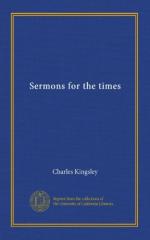Next, ‘He hath showed thee, O man, what is GOOD.’ Not merely what will turn away God’s punishments, and buy God’s rewards; not merely what will be good for thee after thou diest: but what is good, good in itself, good for thee now, and good for thee for ever; good for thee in health and sickness, joy and sorrow, life and death; good for thee through all worlds, present and to come; yea, what would be good for thee in hell, if thou couldst be in hell and yet be good. Not what is good enough for thy neighbours and not good enough for thee, good enough for sinners and not good enough for saints, good enough for stupid persons and not good enough for clever ones; but what is good in itself and of itself. The one very eternal and absolute Good which was with God, and in God, and from God, before all worlds, and will be for ever, without changing or growing less or greater, eternally The Same Good. The Good which would be just as good, and just, and right, and lovely, and glorious, if there were no world, no men, no angels, no heaven, no hell, and God were alone in his own abyss. That very good which is the exact pattern of His Son Jesus Christ, in whose likeness man was made at the beginning, God hath showed thee, O man; and hath told thee that it is neither more nor less than thy Duty, thy Duty as a man; that thy duty is thy good, the good out of which, if thou doest it, all good things such as thou canst not now conceive to thyself, must necessarily spring up for thee for ever; but which if thou neglectest, thou wilt be in danger of getting no good things whatsoever, and of having all evil things, mishap, shame, and misery such as thou canst not now conceive of, spring up for thee necessarily for ever.
This seems to me the plain meaning of the text, interpreted by the plain teaching of the rest of Scripture. Now see how the Catechism agrees with this.
It takes for granted that God has showed the child what is good: that God’s Spirit is sanctifying and making good, not only all the elect people of God, but him, that one particular child; and it makes the child say so. Therefore, when it asks him, ’What is thy duty to God and to thy neighbour?’ it asks him, ’My child, thou sayest that God’s Spirit is with thee, sanctifying thee and showing thee what is good, tell me, therefore, what good the Holy Spirit has showed thee?—tell me what He has showed thee to be good, and therefore thy duty?’
But some may answer, ’How can you say that the Holy Spirit teaches the children their Duty, when it is their schoolmaster, or their father, who teaches them the Ten Commandments and the Catechism?’




